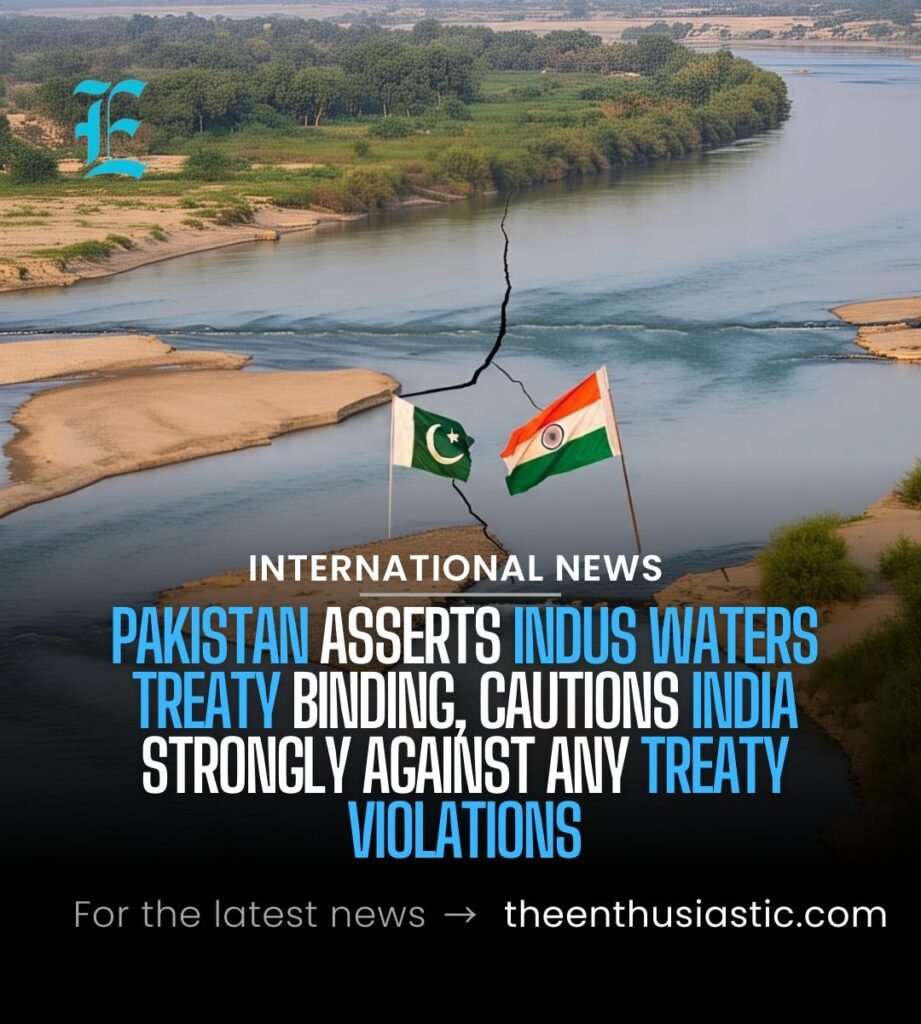Pakistan Reaffirms Indus Waters Treaty as Binding, Warns India Against Violations

Table of Contents
In the wake of escalating tensions following the April attack in Pahalgam, Indian-administered Kashmir, Pakistan has strongly reiterated that the Indus Waters Treaty (IWT) remains a valid and binding international agreement. This comes after India announced the suspension of its participation in the treaty—a move that Pakistan has deemed both legally untenable and diplomatically provocative.
Pakistan Issues Firm Warning
On Thursday, Foreign Office spokesperson Shafqat Ali Khan emphasized that no provision within the Indus Waters Treaty permits suspension, and therefore India’s recent decision holds no legal standing. “The Indus Waters Treaty is not just an agreement—it is an international obligation that both nations are bound to honor. Any violation by India will be met with a firm and proportionate response,” Khan stated. He added that Pakistan is prepared to use “all appropriate legal and diplomatic channels” to defend its water rights.
A Treaty That Has Withstood Wars
Signed in 1960 with the World Bank as a guarantor, the Indus Waters Treaty divides the use of six major rivers between the two nuclear-armed neighbors. India controls the eastern rivers—Ravi, Beas, and Sutlej—while Pakistan has rights over the western rivers—Indus, Jhelum, and Chenab. The treaty has remarkably survived multiple wars and decades of hostilities, making it one of the most durable water-sharing agreements in the world.
Despite the deep mistrust that often characterizes India-Pakistan relations, the IWT has functioned as a rare example of sustained cooperation. Experts warn that undermining this agreement could have far-reaching consequences, not only for bilateral relations but also for regional water security.
India’s Move and Global Response
India’s decision to suspend its engagement with the treaty reportedly stems from security concerns linked to Pakistan-based groups, which New Delhi accuses of orchestrating the Pahalgam attack. However, critics argue that India lacks the legal authority to unilaterally pause or revoke its obligations under the treaty.
World Bank President Ajay Banga addressed the situation, reiterating the Bank’s neutral role. “The World Bank does not act as an arbitrator unless both parties request such involvement,” Banga clarified. “While India has put the treaty ‘in abeyance’ from its perspective, there is no mechanism in the treaty for unilateral suspension. Any amendments or terminations require mutual agreement.”
Banga further confirmed that neither India nor Pakistan has formally engaged the World Bank to initiate arbitration proceedings, though the option remains open under the terms of the treaty.
Strategic and Diplomatic Stakes
Pakistan’s forceful response underscores how vital the Indus River system is to its agriculture, economy, and public health. Experts in Islamabad have warned that any attempt by India to limit water flows could be interpreted as an act of aggression, potentially inflaming already fragile relations between the two countries.
The situation now places international pressure on India to clarify its intentions and return to the treaty framework. It also poses a challenge for global institutions like the World Bank, which must tread carefully to uphold their roles without worsening the geopolitical tensions.
What Lies Ahead
As of now, diplomatic backchannels remain active, but there has been no formal move toward arbitration or renegotiation. With water scarcity becoming an increasing concern across South Asia, analysts stress the importance of maintaining established frameworks like the IWT.
For now, Pakistan remains steadfast in its position: the Indus Waters Treaty is not a bargaining chip, but a cornerstone of regional stability that must be upheld at all costs
